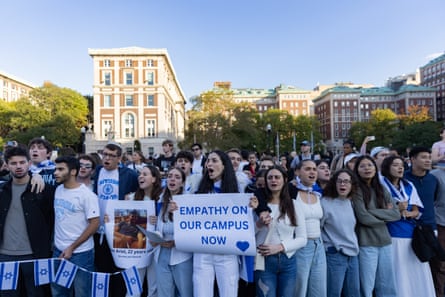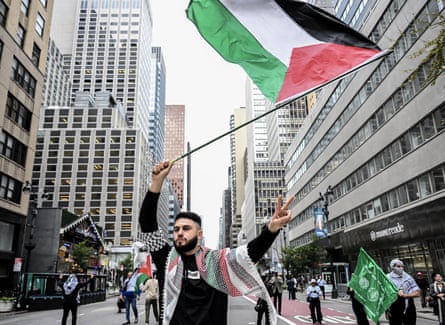To one side, Columbia students stood silently, wrapped in the blue and white of Israel as they gripped pictures of the murdered and abducted. Across the grass and brick divide, a slightly larger cohort of students chanted “Free, free Palestine.”
The faultline between the two ran along the claim by each that the other was pursuing a kind of bloodlust – a charge that has divided university campuses across America in the wake of the bloody Hamas attack on Israeli communities and Israel’s ongoing military assault on Gaza.
Reactions within US universities to the killing of at least 1,300 Israelis and the abduction of more than 100 more have swung from celebration of the Hamas assault as a legitimate act of resistance to occupation to condemnation along with a demand that it not be used to ignore the deaths of Palestinians killed in Israel’s retaliation on Gaza.
The Columbia rallies were part of a “day of resistance” called by National Students for Justice in Palestine which praised the Hamas attack as “a historic win for the Palestinian resistance”. Similar statements by pro-Palestinian groups in other universities meant the protests were regarded by students sympathetic to Israel as rejoicing in the killing.
At Columbia, a Jewish student held aloft a sign: “Stop celebrating the raping, kidnapping and slaughtering of our people.” Another took a different line: “Empathy on campus now.”
A student who gave his name as Yoni said he regarded the pro-Palestinian rally as celebrating death.
“They want to kill us all. The pictures you see here of the dead are only a beginning. They do not believe we have the right to live otherwise why do they not come and mourn our dead with us?” he asked.

However, some protesters in the Palestinian camp viewed the pro-Israel rally as its own justification for killing. Darializa Avila Chevalier said she was there because she fears Israel is unleashing a terrible vengeance on ordinary Palestinians in Gaza where hundreds of civilians – many of them children – have been killed by Israeli bombing.
“It’s about standing with the people of Gaza, and reminding the world that these are humans who deserve to live in dignity, to deserve to live free from occupation, free from colonial brutality, free from the violence that Israel constantly is constantly throwing at them,” she said.
“Since Saturday, a little over 1,500 people have already died in Gaza, and a third of them are children. And yet that level of violence against Palestinians is very rarely discussed. Entire families have been killed.”
Avila Chevalier said she did not regard the protest as celebrating killing but that the violence against Israelis did not happen in a vacuum.
“No one wants violence, right? What people who are engaging in these protests are trying to get across is that this violence didn’t start five days ago, this violence started with Israeli occupation of Palestine,” she said.
This division has spilled across American campuses.
Student organisations at Harvard drew criticism for a statement saying they “hold the Israeli regime entirely responsible for all unfolding violence”. The university leadership then came under fire from a former president of Harvard, Lawrence Summers, for not denouncing the student statement and for failing to make a stronger condemnation of Hamas.
“In nearly 50 years of @Harvard affiliation, I have never been as disillusioned and alienated as I am today,” he said on X.
Others at Columbia sought to recognise the suffering. Justin Onwenu, president of the Columbia law student senate, said it was that the “barbaric attacks by Hamas … should never be justified, minimised or glorified”. But he also spoke about promoting peace and preventing harm to civilians.
Rachel Spiro, a Jewish student at Columbia who spent the previous two years at Tel Aviv University, was clearly emotional as she stood on the edge of the protest in support of Israel. She described the atmosphere on campus as “obviously charged” and said that discussion of the Hamas attack and Israeli bombing of Gaza had dominated her international politics class that day.
“It was respectful. It can be discussed but because people are so far apart there can’t be any agreement,” she said.
But Spiro said there were reasons to be fearful after a Jewish student was attacked in front of the library for holding an Israeli flag.
A graduate student from Syria, who declined to be identified, said he did not support Hamas attacks.

“I came here specifically to say that both parties are responsible for the terrorist attacks. And I don’t agree with Hamas’s move, because it was terrorist and doesn’t represent the Islamic view. They attacked civilians. But Israel did the same thing, but they’re even stronger,” he said.
The student of construction administration said he did not want to be identified because it could damage his career. He was not alone in that.
Other students took note when a major law firm withdrew a job offer from a New York University student, Ryna Workman, after she wrote that Israel’s violence against the Palestinians “created the conditions that made resistance necessary”.
Leading financial figures on Wall Street made a show of saying they would not employ Harvard students who signed the statement blaming Israel for the Hamas attack. A billboard truck drove around Harvard campus displaying the pictures and names of the students, and their addresses and other details were published on websites.
That has discouraged some students from making public statements.
A public health student who initially gave her name but then asked to remain anonymous said she joined the demonstrations because she thought the university leadership had taken sides.
“The multiple emails from every single president of every single college, being in support of Israel and not even acknowledging lives lost to Palestinians – this is why I’m here,” she said.
“Especially in [the school of] public health, you would think because they work with human rights and they work for the public, they would be supportive of people losing lives across the world.”
Source: The Guardian









